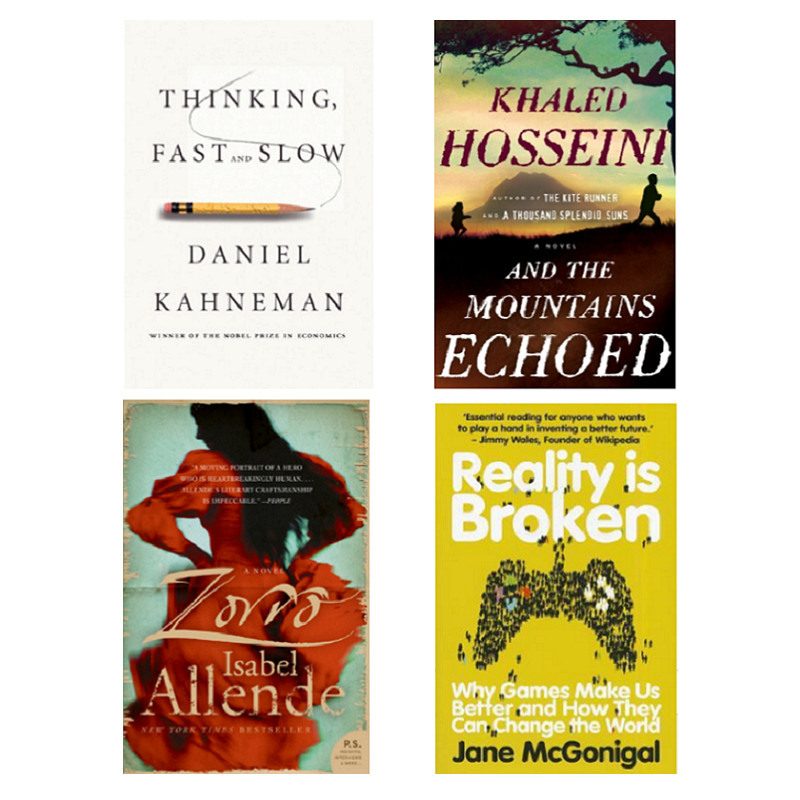A good review deserves to be read; and so, I am very excited to bring to you a brand new feature to Sahar’s Reviews: a monthly round-up of four of my wonderful husband’s reviews (which he also posts on his blog and on Goodreads). And we are starting this feature with Zorro, by Isabel Allende, Thinking, Fast and Slow by Daniel Kahneman, And the Mountains Echoed by Khaled Hosseini, and Reality Is Broken: Why Games Make Us Better and How They Can Change the World by Jane McGonigal
My rating: 4 of 5 stars
I have been fascinated by the story of Zorro ever since watching the TV series in the early 90s, so when the opportunity came to read a book about him, I did not hesitate to pick it up.
While it is always fun and exciting to read the stories of heroes and how they came to be, Diego de la Vega’s striving for justice does not come out as too heroic or over the top. We get to follow his struggles as he grows up, caught between two parents and cultures, not knowing where he really belongs. As he travels to Spain to continue his education, while always proficient in his undertakings, he also has his occasional shortcomings. However, his desire for justice is always his guide.
The narrative is well-written and captivating, and leads you along the way through his life without ever feeling boring. Knowing that at some point he will return and take on the double life of Diego and Zorro, it is still an interesting and compelling read, wanting to know how he gets there and what happens along the way. Recommended!
Thinking, Fast and Slow by Daniel Kahneman
My rating: 4 of 5 stars
We know already that our eyes can deceive us, but in Thinking, Fast and Slow we also learn that our minds can deceive us!
Kahneman talks about the two different types of minds that we have – the fast-thinking one (System 1) that makes quick decisions and rationalizes it; and the slow-paced one (System 2) that does rational analysis. However, sending things “back” to System 2 is a costly effort, and it is very easy for us to forget to do that, leading us to oftentimes make decisions that seem irrational on a deeper analysis.
Each chapter is relatively short, with some very good examples backed by research. It becomes a bit overwhelming to think of how many ways there are that we make mistakes in our thinking and planning and decision-making, but by just being a bit more aware of it, we can avoid many of the pitfalls.
I think even if we just learn a little bit, slow down and think about what we decide and why, we will be smarter for it. And hopefully we will be able to make just a tiny bit better decisions!
And the Mountains Echoed by Khaled Hosseini
My rating: 5 of 5 stars
Khaled Hosseini’s book always make me shed a tear or two. This one was no different.
And the Mountains Echoed tells the story of a family in Afghanistan whose events in life scatter them around the world. We get to follow a series of interconnected stories, where the main protagonists of the book weave in and out of each other’s lives, for better or worse. Each chapter has an element of sadness and almost despair to it, which is then interwoven with some sort of joy and happiness. There is something gripping in the way the chapter alternates back and forth between past and present, making you want to just continue reading on and on.
As with his other books, And the Mountains Echoed makes me think of our relationships and how we act towards each other. The consequences of our actions go a long way, even though we may not have that intention or foresight. This book really takes an interesting look at it, when the consequences of an act of seeming kindness ends up not working out well for almost anyone.
I highly recommend reading this book, even though it has its heartbreaking moments.
Reality Is Broken: Why Games Make Us Better and How They Can Change the World by Jane McGonigal
My rating: 5 of 5 stars
Have you ever wondered if you’re wasting your time playing games? Jane McGonigal wants us to believe that we’re not, and that we in fact are preparing ourselves for the future, to create a better world. While that may seem a bit too optimistic and over-enthusiastic at first, she does present a good case for why games can help us improve reality – her TED talk (https://www.youtube.com/watch?v=dE1Du…) has reached over 700000 views.
The book is based on research on how to motivate individuals, and provides practical solutions (or fixes, as she calls them) on aspects of games that can be applied to real life. She is perhaps a bit too eager to jump to conclusions with regards to how games are the best embodiment of some aspect of research, there is good reason to believe that a balanced amount of playing games can be useful both for the individual and humanity at large.
Is the book worth reading? Definitely. There are many aspects of games that can be used to apply in our everyday lives, and this book provides many of ideas on what to look for and where.
(This book was actually so enjoyable that I went on to read the appendices as well. Mind you, they were practical tips for gamers, so maybe that has something to do with it too.)
First published on Sahar’s Reviews on 2 February 2015.

